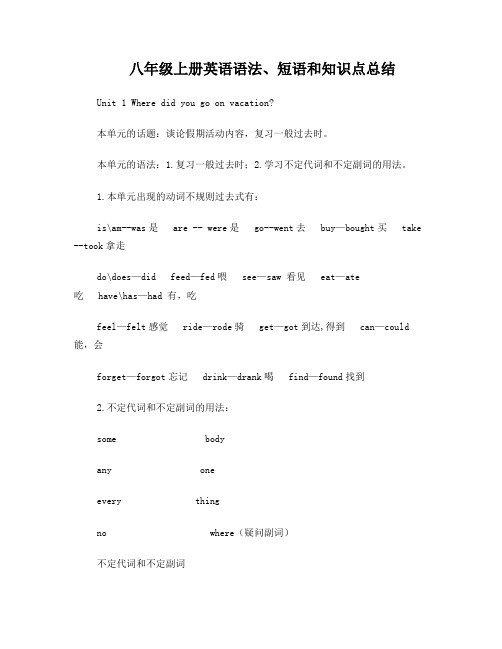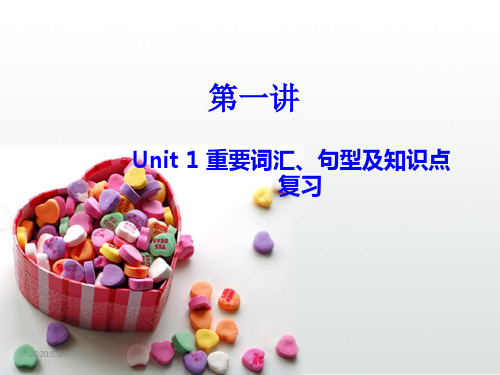八年级英语上册unit1---5知识点教案资料
- 格式:doc
- 大小:72.50 KB
- 文档页数:21

八年级上册英语Unit1-5单元知识点归纳Unit 1 Where did you go on vacation?一、短语归纳1. go on vacation =take/ have a vacation 去度假2. stay at home 待在家里3. go to the mountains/the beach/summer camp 去山区/海滩/ 夏令营4. visit museums/ my uncle 参观博物馆/看望我的叔叔或伯伯5. study for… 为……而学习6. go out 出去7. most/many/ much/some of. 大部分/许多/一些……8. have a good time= have fun= enjoy oneself 玩得高兴;过得愉快9. of course 当然;自然10. keep a diary 记日记11. go shopping/fishing/camping/skating /boating/ hiking/swimming 去购物/钓鱼/野营/滑冰/划船/远足/游泳12. in the past 在过去13. walk around 四处走走14. too many/much 太多15. because of 因为16. one bowl of… 一碗……17. the next day 第二天18. drink tea 喝茶19. find out 找出;查明20. go on 继续21. take photos 照相22. something important 重要的事23. up and down 上上下下24. come up 升起25. wait for 等待26. in excitement 兴奋地;激动地27. bring back…from… .从……带回……28. walk up to 步行到…二、用法集萃1. quite a few/a little/a lot(of) 相当多;不少eg: We took quite a few photos there.我们在那里拍了很多照片。

八年级上册u1到u5知识点八年级的学习内容相对较多,其中Unit1到Unit5的知识点是基础重要的部分。
下面将针对这几个单元的知识点进行详细的讲解,帮助同学们更好地掌握这些基础知识。
Unit 1 – How do you study for a test?本单元重点介绍了如何备考考试以及学习方法和技巧的应用。
具体知识点包括:1. 谈论自己的备考及学习方法2. 给出建议和指导学习方法3. 辨别常见的学习策略的用途和适当的时间点4. 介绍学习策略的目标和效益5. 排列整理优先级,准备学习计划Unit 2 – How often do you exercise?本单元的主要内容是有关健康生活与锻炼的话题,让学生更好地理解身体健康保健的重要性及如何保持健康。
具体知识点包括:1. 谈论生活方式2. 分析健康的生活方式及不健康的生活方式的对比3. 介绍日常锻炼的方法4. 谈论自己的运动偏好与习惯5. 推荐友好的锻炼方式和运动项目Unit 3 – What are you doing for the environment?本单元的内容是关于环保的话题,让学生了解如何保护环境及宣传节约能源、减少浪费。
具体知识点包括:1. 谈论环保的重要性2. 简述环保法规和节约能源的自我责任3. 分析环境问题对生活带来的影响和危害4. 介绍日常生活中的环保习惯5. 推荐环保机构和组织Unit 4 – I used to be afraid of the dark本单元的内容主要是讨论成长、变化和心理方面的话题。
让学生了解人在成长过程中会经历的身体和心理的变化以及应对方法。
具体知识点包括:1. 谈论成长和变化2. 分析身体和心理的变化3. 介绍自我认知和情感养育4. 分析儿童与青少年的焦虑感和压力5. 推荐有关成长和心理养育的资源Unit 5 –What’s the matter?本单元的内容是关于身体疾病和生活健康的话题,让学生了解常见疾病及治疗方法,并掌握如何预防和保护自己的生命健康。

八年级上册英语语法、短语和知识点总结Unit 1 Where did you go on vacation?本单元的话题:谈论假期活动内容,复习一般过去时。
本单元的语法:1.复习一般过去时;2.学习不定代词和不定副词的用法。
1.本单元出现的动词不规则过去式有:is\am--was是 are -- were是 go--went去 buy—bought买 take --took拿走do\does—did feed—fed喂 see—saw 看见 eat—ate吃 have\has—had 有,吃feel—felt感觉 ride—rode骑 get—got到达,得到 can—could 能,会forget—forgot忘记 drink—drank喝 find—found找到2.不定代词和不定副词的用法:some bodyany oneevery thingno where(疑问副词)不定代词和不定副词(1)左边的some、any、every、no与右边的body、one、thing构成不定代词,some、any、every、no与右边的疑问副词where构成不定副词;(2)一般情况下以some开头的不定代词和不定副词用于肯定句,以any开头的不定代词和不定副词用于否定句、疑问句;以no开头的不定代词和不定副词表示否定含义(no one为两个单词);(3)不定代词或不定副词和形容词连用时,形容词放在后面。
He has something important to do.他有重要的事情要做。
(肯定句用something,形容词important放后)Did you buy anything special? (一般疑问句用anything,形容词special放后)Did you go anywhere interesting last month?上个月你去令人感兴趣的地方了吗?(一般疑问句用不定副词anywhere,形容词interesting放后)(4)不定代词和不定副词做主语时,后面的动词用单数形式。

八年级英语上册Units1-5单元知识点归纳(1)新目标八年级上册英语Units1-5单元知识点归纳Unit1 Where did you go on n?go XXX去度假stay at home待在家里go to the mountains 去爬山go to the beach去海滩visit museums参观博物馆go to summer camp去参观夏令营quite a few相当多study for为……而研究go out出去most of the time大部分时间taste good尝起来很好吃have a good time玩得高兴of course当然XXX 给……的感觉;感受到go shopping去购物in XXX在过去walk around四处走走because of因为one bowl of…一碗……the next day第二天drink XXX喝茶find out找出;查明go on继续take photos照相something important重要的事up and e up出来buy sth。
for sb。
/ buy sb。
sth.为某人买某物XXX.尝起来……look+adj.看起来……nothing…but+动词真相除……以外甚么都没有seem+(to be)+ adj.看起来……XXX小地点到达某地XXX do sth.决定去做某事XXX做某事/ try to do sth.极力去做某事XXX.忘记做过某事XXX.忘记做某事XXX喜欢做某事want to do sth.想去做某事start。
XXX停止做某事dislike doing sth.不喜欢做某事keep XXX继续做某事Why not do。
sth。
为什么不做……呢?so+adj.+that+从句如此……以至于……tell sb。
(not) to do sth.告诉某人(不要)做某事Unit2 How often do you exercise?help with housework帮助做家务on XXX在周末how often 多久一次hardly ever几乎从不once a ice a month每月两次every day每天be free有空go to the movies去看电影use the 用互联网swing dance摇摆舞play XXX打网球stay up late熬夜;睡得很晚at least至少have dance and piano lessons上舞蹈课和钢琴课go to bed early 早点睡觉play sports进行体育活动be good for对……有好处go camping去野营not…at all一点儿也不……in one’s free time 在某人的业余时间the most popular最受欢迎的such as比如;诸如old habits die hard积难改go to the dentist去看牙医morn than多于;超过less than少于Unit3 I’m XXX.XXX…与……一样……。


8年级上册1---5单元重要知识点汇总Unit 1 Where did you go on vacation?1.一般过去时的特殊疑问句及其回答教材原文—Where did you go on vacation?你去哪里度假了?—I went to the mountains.我去山里了。
问句是一般过去时的特殊疑问句,其结构为:特殊疑问词+did+主语+动词原形+其他?其中did是助动词,其后的动词要用原形。
如:—What did you do yesterday afternoon?你昨天下午干什么了?—I played tennis with my friend.我和我的朋友一起打网球了。
2.anywhere的用法教材原文Oh, did you go anywhere interesting?哦,你去什么有趣的地方了吗? anywhere:副词,意为“任何地方;无论何处”,常用于否定句、疑问句和条件状语从句中与修饰语连用时,修饰语要置于anywhere之后somewhere:意为“某个地方”,常用于肯定句,与修饰语连用时,修饰语要置于somewhere之后everywhere:表示“到处;处处”,常用于肯定句nowhere:表示“不在任何地方;任何地方都不”,相当于not anywhereI cannot find it anywhere.我在什么地方都没找到它。
Are you going anywhere tonight?今晚你要去什么地方吗?If you go anywhere, take me with you.你要是去什么地方,带我和你一起去。
I remember seeing him somewhere.我记得在哪儿见过他。
You can go anywhere interesting if you want.如果你想,你可以去任何有趣的地方。
3.How is/was...?句型的用法教材原文How was your vacation?你的假期怎么样?How is/was...?意为“……怎么样?”,是一个表达问候的句型。
人教版八年级英语上册 unit1--5 知识点人教版八年级上册英语知识点Unit1 Where did you go on vacation 1. go on vacation 去度假at home 待在家里to the mountains 去爬山 4. go to the beach 5. visit museums 6. go to summer camp a few for out of the time 11. taste good a good time 13. of course like shopping the past 17. walk around 18. because of 19. one bowl of…去海滩参观博物馆去参加夏令营相当多为……而学习出去大部分时间尝起来很好吃玩得高兴当然给……的感觉;感受到去购物在过去四处走走因为一碗……20. the next day 第二天 21. drink tea 喝茶22. find out 找出;查明 23. go on 继续 photos 照相 25. something important 重要的事26. up and down 上上下下27. xxe up 出来 28. buy sth. for sb. / buy sb. sth. 为某人买某物29. taste + adj.尝起来……30. look+adj. 看起来………but+动词原形除了……之外什么都没有 ++ adj. 看起来…… 33. arrive in+大地点 / arrive at+小地点到达某地 to do sth. 决定去做某事 35. try doing sth. 尝试做某事 / 36. try to do sth. 尽力去做某事37. forget doing sth. 忘记做过某事/ 38. forget to do sth. 忘记做某事 39. enjoy doing sth. 喜欢做某事 40. want to do sth. 想去做某事41. start doing sth. 开始做某事 42. stop doing sth. 停止做某事 43. dislike doing sth. 不喜欢做某事 44. keep doing sth. 继续做某事 45. Why not do. sth.为什么不做……呢?46. so+adj.+that+从句如此……以至于…… 47. tell sb. (not) to do sth. 告诉某人做某事Unit2 How often do you exercise1 help with housework帮助做家务2 on weekends 在周末3 how often 多久一次4 hardly ever 几乎从不5 once a week 每周一次6 twice a month 每月两次7 every day 每天8 be free 有空9 go to the movies 去看电影 10 use the Internet 用互联网 11 swing dance 摇摆舞 12 play tennis 打网球13 stay up late 熬夜;睡得很晚14 at least 至少15 have dance and piano lessons 上舞蹈课和钢琴课 16 go to bed early 早点睡觉 17 play sports 进行体育活动 18 be good for 对……有好处 19 go camping 去野营20 not…at all 一点儿也不…… 21 in one’s free time 在某人的业余时间22 the most popular 最受欢迎的 23 such as 比如;诸如24 old habits die hard 积习难改25 go to the dentist 去看牙医26 morn than 多于;超过27 less than 少于28 help sb. with sth. 帮助某人做某事29 How about…......怎么样?/ ……好不好? 30 want sb. to do sth. 想让某人做某事31 How many+可数名词复数+一般疑问句?……有多少…… 32 主语+find+that从句. ……发现……33 spend time with sb. 和某人一起度过时光 34 It’s+ adj.+ to do sth. 做某事的……的。
Unit 1 Where did you go on vacation?Section A 1 (1a-2d)一、教学目标:1. 语言知识目标:1) 能掌握以下单词:anyone, anywhere, wonderful, quite a few, most, something, nothing, everyone, of course, myself, yourself能掌握以下句型:①—Where did you go on vacation? —I went to the mountains.②—Where did Tina to on vacation? —She went to the beach.③—Did you go with anyone? —Yes, I did./No, I didn’t.2) 能了解以下语法:—复合不定代词someone, anyone, something, anything等的用法。
—yourself, myself等反身代词的用法。
3)一般过去时态的特殊疑问句,一般疑问句及其肯定、否定回答。
2. 情感态度价值观目标:学会用一般过去时进行信息交流,培养学生的环保意识,热爱大自然。
二、教学重难点1. 教学重点:1) 用所学的功能语言交流假期去了什么旅行。
2) 掌握本课时出现的新词汇。
2. 教学难点:1) 复合不定代词someone, anyone, something, anything等的用法。
2) yourself, myself等反身代词的用法。
三、教学过程Ⅰ. Lead-in1. 看动画片来进入本课时的主题谈论上周末做了些什么事情,谈论过去发生的事情。
Ⅱ. Presentation1. Show some pictures on the big screen. Let Ss read the expressions.2. Focus attention on the picture. Ask: What can you see? Say: Each picture showssomething a person did in the past. Name each activity and ask students to repeat: Stayed at home, Went to mountains, went to New York City 6. Went to the beach, visited my uncle, visited museums, went to summer camp3. Now, please match each phrase with one of the pictures next to the name of the activity,point to the sample answer.4. Check the answers. Answers: 1. f 2. b 3. g 4. e5. c6. a7. dIII. Listening1. Point to the picture on the screen.Say: Look at the picture A. Where did Tina go on vacation? She went to mountains. Ask: What did the person do in each picture?2. Play the recording the first time.3. Play the recording a second time.Say: There are three conversations. The people talk about what did on vacation. Listen to the recording and write numbers of the names in the right boxes of the picture.4. Check the answers.IV.Pair work1. Point out the sample conversation. Ask two Ss to read the conversation to the class.2. Now work with a partner. Make your own conversation about the people in the picture.3. Ss work in pairs. As they talk, move around the classroom and give any help they need.4. Let some pairs act out their conversations.V. Listening1. Tell Ss they will hear a conversation about three students’ conversations. Listen for the first time and fill in the chart. Then listen again and check Yes, or No.2. Let Ss read the phrases in the chart of 2b.3. Play the recording the first time. Ss listen and fill in the chart.4. Play the recording a second time for the Ss to check “Yes, I did.”or “No, I didn’t. ”5. Check the answers with the Ss.VI. Pair work1. Let two Ss read the conversation between Grace, Kevin and Julie.2. Let Ss work in pairs and try to role-play the conversation.3. Ask some pairs to act out their conversations.VII. Role-play1. First let Ss read the conversation and match the people and places they went.2. Let Ss act out the conversations in pairs.3. Some explanations in 2d.Homework:用英语询问你的一位好朋友,她(他)假期去了哪里?看到了什么?并将此对话写在作业上。
八年级上册一至五课知识点八年级上册是初中阶段的重要课程之一,包括了许多丰富的知识点,本文将从第一课到第五课讲述重点知识。
第一课:Unit 1 Where did you go on vacation?- 本单元主要涉及旅游地点、主要活动以及过去式的应用。
- 学生需要掌握不同的旅游地点的名称,如城市、国家、海滩等。
- 此外,还需要学会使用过去式来描述已经发生的事情,比如went, ate, saw 等。
第二课:Unit 2 How often do you exercise?- 本单元主要涉及频率的表达,如 everyday, once a week, twice a month 等。
- 学生需要学会说出自己做某些事情的频率,并且要准确使用时间表达式。
- 此外,还要学习如何用现在进行时来描述正在进行的动作。
第三课:Unit 3 Why do you like koalas?- 本单元主要涉及表达个人喜好和兴趣爱好。
- 学生需要学会表达自己对于各种事物的看法和感受。
- 此外,还需要学习一些关于动物的词汇,如 endangered species, herbivore, carnivore 等。
第四课:Unit 4 I want to be an actor.- 本单元主要涉及职业和工作的讨论。
- 学生需要学会表达自己对于不同职业的看法和兴趣。
- 此外,还需要学习一些与职业相关的词汇,如 job interview, salary, experience 等。
第五课:Unit 5 Do you want to watch a game show?- 本单元主要涉及娱乐和节目的讨论。
- 学生需要学会表达自己对于不同类型娱乐节目的看法和兴趣。
- 此外,还需要学习一些与娱乐节目相关的词汇,如 game show, reality show, talent show 等。
总的来说,八年级上册课程的主要学习内容是涵盖丰富多彩的,需要学生投入大量的时间和精力来掌握。
八年级英语上册u n i t1---5知识点Unit1一、词组、短语:1、go on vacation去度假,2、 stay at home 呆在家,3、go to the mountains 上山/进山,4、 go to the beach到海边去,5、visit museums 参观博物馆,6、go to summer camp 去夏令营,7、 quite a few 相当多, 8、study for为……学习,9、go out 出去, 10、most of the time 大部分时间/绝大多数时间,11、taste good 尝起来味道好, 12、have a good time玩的开心,13、of course当然可以, 14、feel like感觉像……/想要15、 go shopping购物, 16、in the past 在过去,17、walk around绕……走, 18、too many 太多(可数名词前面),19、because of 因为, 20、one bowl of 一碗……,21、find out 查出来/发现, 22、go on继续,23、take photos 照相, 24、something important重要的事情,25、up and down上上下下, 26、come up出来二、重要句子(语法):1.Where did you go on vacation?你到哪里去度假了?I went to New York City.我去了纽约城2.Did you go out with anyone? 你出去带人吗?No, No one was here. Everyone was on vacation.不,没有人在这了,大家都度假去了了。
3. Did you buy anything special?你买了什么特别的东西吗?Yes, I bought something for my father.对,我给父亲买了一些东西。
4.How was the food? 食物怎么样?Everything tasted really good.每一样东西真的都好吃。
5.Did everyone have a good time?大家玩的开心吗?Oh, yes. Everything was excellent.对,一切都很精彩。
三、习惯用法、搭配1. buy sth. for ab./ buy sb. sth. 为某人买某物2. taste + adj. 尝起来……3. nothing …,but + V.(原形) 除了……之外什么都没有4. seem + (to be) + adj 看起来 12. look + adj 看起来5. arrive in + 大地方 / arrive at + 小地方到达某地6. decide to do sth. 决定做某事7. try doing sth. / try to do sth. 尝试 / 尽力做某事8. enjoy doing sth. 喜欢做某事 9. want to do sth. 想去做某事10. start doing sth. 开始做某事 11. stop doing sth. 停止做某事12.stop to do sth.停下来去做某事。
13. dislike doing sth. 不喜欢做某事14. Why not do sth. 为什么不做…….呢?15. so + adj + that + 从句如此……以至于……17. keep doing sth. 继续做某事16. tell sb. (not) to do sth. 告诉某人(不要)做某事18. forget to do sth. 忘记去做某事 / forget doing sth 忘记做过某事四、词语辨析:1.visited my uncle 看望了我的叔叔(P1)visit是及物动词,意为―拜访;探望,后接表示人的名词或代词。
visit还可以意为―参观;游览,后接表示地点的名词。
a.I visited my grandmother last week. 上周我去______了我的外婆。
b.Do you want to visit Shanghai? 你想______上海吗?拓展:visitor意为―参观者;游客‖。
eg: These visitors come from America.2.buy anything special 买特别的东西。
(P2)1)buy及物动词,意为―买;购买。
其过去式为bought拓展:buy sth. for sb.=buy sb. sth. 意为―给某人买某物。
My uncle_____ _____a bike.= My uncle_____ _____for me.2)anything不定代词,意为―某事;某件东西,主要用于疑问句或否定句中。
a.Do you want anything from me?b.I can’t say anything about it.3) anthing special表示―特别的东西,形容词修饰不定代词时后置。
Is there________ ________in this book?这本书里有新的内容吗?4.Oh, did you go anywhere interesting?哦,你去有趣的地方了吗?(P2)辨析:anywhere与somewhereanywhere意为―在任何地方,常用于否定句和疑问句中。
eg:I can‘t find it anywhere.somewhere意为―在某处;到某处,常用于肯定句中。
eg:I lost my key somewhere near here.5.We took quite a few photos there.我们在那里拍了不少照片。
(P2)辨析:quite a few与quite a littlequite a few 意为―很多;不少,修饰可数名词复数;quite a little 意为―很多;不少,修饰不可数名词。
a.He stays here for _____ _____ _____days.b. b.There is _____ _____ _____water in the bottle(瓶子).6. I just stayed at home most of the time to read and relax. 我大部分时间只是待在家里读书休息。
(P2)拓展most of…意为―……中的大多数,它作主语时,谓语动词取决于most of 后所修饰的名词。
a. Most of us_____(be)going to the park. 我们大多数人要去公园。
b. Most of the food_____(go)bad. 大部分的食物都变质了。
7.Everything tasted really good!所有的东西尝起来真的很好吃!(P3)taste在此为系动词,意为―尝起来,其后接形容词构成系表结构。
a.The food tastes really great.食物尝起来棒极了。
8.How did you like it? 你觉得它怎么样?(P3)How do/did you like……? 意为―你觉得……怎么样?‖,用来询问对方的观点或看法,相当于 What do you think of……?9. Still no one seemed to be bored. (即使这样)仍然没有人看起来无聊。
(P3)1)seem意为―好像;似乎;看来。
Everything seems easy.一切似乎很容易。
拓展a. seem+adj. ―看起来……。
You seem happy today.你今天看起来很高兴。
b. seem+to do sth. ―似乎,好像做某事。
I seem to have a cold.我似乎感冒了。
c. It seems/seemed+从句―看起来好像…;似乎…。
It seems that no one believes you.看起来好像没有人相信你。
2)辨析:bored与boringa. bored意为―厌烦的;感到无聊的‖,一般在句中修饰人。
b. boring意为―无聊的;令人厌烦的‖,一般在句中修饰事或物。
10. What activities do you find enjoyable? 你发现什么活动让人快乐?(P5)1)activities是activity的复数形式,意为―活动。
2)enjoyable形容词,意为―愉快的;快乐的。
I‘m sure we will have an enjoyable vacation. 我确信我们将会有一个愉快的假期。
11. I arrived in Penang in Malaysia this morning with my family. 今天早上我和家人到达了马来西亚的槟城。
辨析:①arrive in+大地点 / arrive at+小地点②get to +地点③reach+地点12. …so we decided to go to the beach near our hotel…因此我们决定到旅馆附近的海滩上去。
拓展:decide后常跟―疑问词+动词不定式‖做宾语。
He can’t decide when ______ _____(leave) 他不能决定何时动身。
13. I felt like I was a bird. It was so exciting! 我感觉自己就像一只小鸟。
太刺激了!(P5) 1)feel like意为“给……的感觉;感受到”。
其后常接从句。
eg: He feels like he is swimming. 他感觉像在游泳一样。
拓展:feel like还可意为“想要……,其后可接名词、代词或动名词。
即:feel like sth. 想要某物 feel like doing sth. 想要做某事14. There are a lot of new buildings now…现在有许多新的建筑物……(P5)building 可数名词,意为建筑物;楼房。
build 动词,建造,建筑(built,built),15. I wonder what life was like here in the past. 我想知道在这儿过去的生活是什么样的。
(P5)wonder此处是及物动词,意为想知道;琢磨‖。
其后常接who, what, why等疑问词引导的宾语从句。